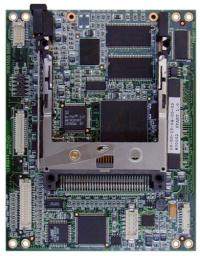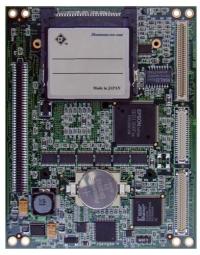Hard real-time Linux for highly integrated low-power SOCs
Sep 23, 2003 — by LinuxDevices Staff — from the LinuxDevices Archive — 1 views FSMLabs' RTLinuxPro hard real-time operating system development kit is now available for Bright Star Engineering's AMD Alchemy based Spartacus and picoEngine boards capable of running at 500MHz on half a watt of power. FSMLabs calls its kit “a Linux based self-contained cross development system” that includes FSMLabs RTCore real-time operating system, a ruggedized embedded Linux system, and a full set of development tools.
FSMLabs' RTLinuxPro hard real-time operating system development kit is now available for Bright Star Engineering's AMD Alchemy based Spartacus and picoEngine boards capable of running at 500MHz on half a watt of power. FSMLabs calls its kit “a Linux based self-contained cross development system” that includes FSMLabs RTCore real-time operating system, a ruggedized embedded Linux system, and a full set of development tools.
Click for larger view of concept device based on Spartacus board
Bright Star Spartacus and picoEngine boards boards feature MIPS architecture system-on-chip (SOC) AMD Alchemy processors that provide up to 500MHz at 1/2 watt. “The [Alchemy] chips provide excellent performance at incredibly low power levels,” said Matt Sherer, FSMLabs product manager.


BSE Spartacus, top and bottom. Click for larger view
Bright Star's Spartacus board sees use in the company's BSE Modular Handheld Diagnostic Platform optimized for automotive service tools. Bright Star says it is already delivering RTLinux enabled boards to Daimler-Chrysler. “Our customers have asked us to provide hard real-time capabilities at low power consumption to support applications in manufacturing and diagnostic equipment, and RTLinuxPro gives us both,” said Stuart Adams, BrightStar's CEO.
The RTCore operating system included with the RTLinuxPro develoment kit is a POSIX PS51 robust “hard” real-time kernel sold under a commercial license both in binary and source. It employs a patented dual kernel technique to run Linux or BSD Unix as applications. Hard real-time software runs at hardware speeds while an open-source UNIX is available to non-real-time components, says FSMLabs. It runs on a range of platforms from high end clusters of multiprocessor P4s/Athlons to low power devices like the MPC860, Elan 520, and ARM7.
This article was originally published on LinuxDevices.com and has been donated to the open source community by QuinStreet Inc. Please visit LinuxToday.com for up-to-date news and articles about Linux and open source.